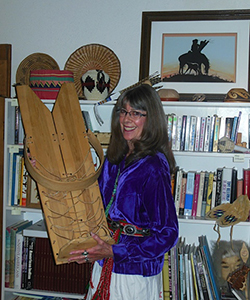
Lives of Consequence
Dagne Samuelson Sollid '65

Dagne Samuelson Sollid ’65 comes from a family of teachers whose philosophy and sense of social equity have shaped her own career as an educator.
Her mother Helen Eisenhauer P’65, who taught kindergarten for 61 years, was born “in the Edwardian Age when women weren’t regarded as valuable, contributing members of society,” Sollid recalls. “Yet from a very early age she always seemed to entertain the radical notion that girls were just as talented and capable as boys.”
Sollid’s mother and stepfather, Albert Eisenhauer ’47, a Hobart graduate and sixth grade teacher for 37 years, encouraged Sollid to become whatever she wanted to be and in that regard were “a major influence in my life,” she says. “Fabulous teachers. Encouragers. Life-long learners. They read a lot. We had about 20,000 books in our home. While I was growing up, my stepdad read to my mom and I from one of them nearly every night as we did the supper dishes. I got kind of a wide education from that. He read a lot about Native Americans. I couldn’t get enough. It made me decide I really wanted to work with the Native American community.”
And she did. After graduating from William Smith and earning her master’s in education at Cornell University, Sollid taught first grade for many years in a public school on a Navajo Indian reservation in Fort Defiance, Ariz.
“I taught them and the few Anglo children I had, to appreciate each other’s heritages and cultures and value each other as unique individuals who had special contributions to make in our classroom and in the world around us,’’ she says. “I taught them we were all Americans and encouraged them to develop their individual talents and strengths to use whether they remained on the reservation or not.’’
Sollid also remained close to some former students after graduation. “One Navajo girl wrote she was going to become a lawyer or a special education teacher,’’ she recalls. “Another boy’s father wrote, ‘This kid had the best first grade teacher in the world who set him on the right path.’ Wow! That was the best paycheck in the world for me.”
Sollid has written training modules to help Navajo women become Head Start teachers; taught Hispanic students in New Mexico; worked with the Bradbury Science Museum in Los Alamos; and taught Navajo culture in college. But she says her work with the children in Fort Defiance was the highpoint of her career.
“I grew as a person,” she says, “and learned much from the Navajos; mainly to try to see the good in everyone.”
